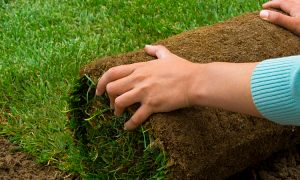Guest post by Katie Marie
It’s time to start winterizing your yard! Harsh winters are hard on the grass in Philadelphia and preparing your lawn for this is essential. Without doing so, your lawn won’t be able to build up the tolerance to diseases and organisms that harm your yard, and the constant fluctuations of winter temperatures.
Start early enough so that the required nutrients can be absorbed into the soil. If you start winterizing your yard in the fall, then more nutrients can be absorbed by your lawn before the snow starts.
Clean up the Lawn
First, rake up any and all leaves and debris and bag it. If leaves and debris remain on your lawn, this can cause dead brown spots, or the grass can dry out. The most efficient way is to rake the leaves and bag them as they fall off your trees. Also, remove any spent plants and branches from your lawn for a better growth of grass in the spring.
When you rake up leaves, watch for weeds and remove any you find. Weeds will go to seed in the fall, with seeds just waiting to be blown by the wind, or catch on your pant leg as you brush past them. When they start to grow in the spring again, it means more work for you and an unhealthy lawn. Take preventive action by pulling out weeds when you see them throughout the warmer seasons.
Check pH Levels
Check the soil’s pH levels before adding any nutrients or chemicals. When you do a pH test, you’ll know what it is exactly that your lawn needs to have added to it. You can either hire a professional to do the check or buy a soil pH tester and do the test yourself.
Don’t prune anything during the autumn months because this could cultivate new growth on your trees and bushes. New growth will be destroyed in cold Philadelphia winters and at the same time use valuable nutrients. You’ll find that you’ll be pruning the dead growth from your trees and bushes in the spring as well. This will cause unnecessary work for you that you could have avoided.
Aerate
After checking the pH and not pruning, you’ll want to aerate your lawn. Aerating helps the process of putting air and water into the soil down to the roots of your grass by first opening the soil up for more direct access. It also allows nutrients to soak into the soil for better and longer lasting results. If you had a high amount of traffic over your lawn during the summer, this is a definite step to take. The high traffic will cause compression on your lawn which hinders water and air getting into it.
Dethatch
Aeration and dethatching your lawn are both good to do during this time. Thatch can cause numerous problems with your yard, including brown spots and dead grass. After raking, you’ll be able to see where the thatch areas are and vigorously rake them and dispose of the debris.
Fertilize
A winter fertilizer is what can often be referred to as the winterizer, itself. Find the best winterizer to add to your lawn to help with the cold weather survival. The same ingredients that are used in lawn food are used for winterization. However, the ingredient ratio is noticeably different. It’s because winterizer is made up of more potassium and phosphorus and less nitrogen. If you have cool-season grass, it’s important to use a winter fertilizer with potash. This will help to strengthen the roots of your lawn over the cold winter months.
Mow
This time of the year, the mowing frequency in Philadelphia certainly slows down, with 43 percent of residents mowing weekly, and 28 percent of residents mowing once a month. So, for the last mowings of the year, lower the height of your mower a half-inch below what the height is for the summer months. This gives the lawn a chance to avoid damage from disease and prepare for the Philadelphia winter onslaught. If a mulching mower is used, then those clippings can be left on the lawn — this will provide nutrients for the grass and protect the crown of the grass.
Prep Your Irrigation Systems
Don’t forget about your irrigation systems. The freezing winter can cause pipes to burst in a matter of hours. Take the time to shut off sprinklers, outdoor faucets, and other water sources and drain them. Make sure you allow enough time so that proper drainage happens. If you have a watering system, read the instruction manual so that you do it correctly or call a professional to drain it.
The secret of winterizing your lawn is to do it early enough so that the lawn gets the valuable nutrients it needs to survive the harsh winter in the Philadelphia area. Even if you are a little late in the season, there are still ways to help your lawn through the cold and prepare for a green spring!
Katie Marie is a writer, avid yogi, and outdoor explorer. She spends most of her time practicing meditation and wellness using organic elements within nature.
[cf]skyword_tracking_tag[/cf]






